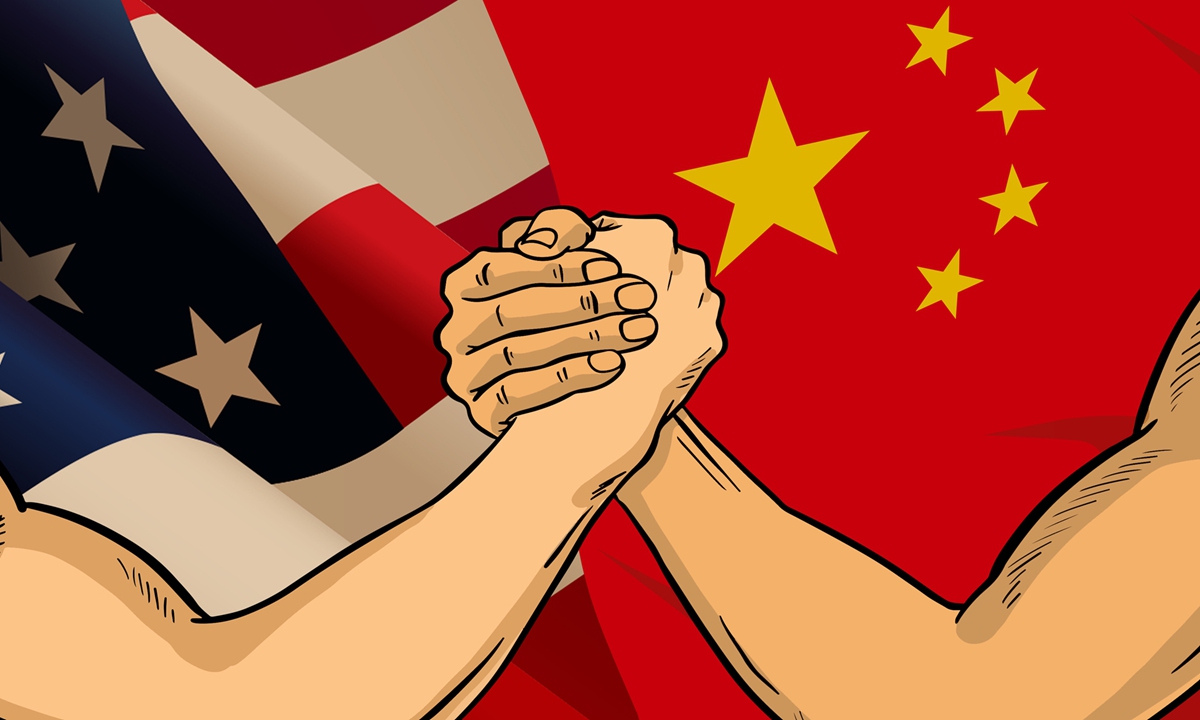
China-US relations Photo: GT
It has been more than two months since US President Joe Biden took power. The tone of his China policy has become basically clear - regarding China as the "most serious competitor," highlighting competition with China in many fields while also taking necessary cooperation and confrontation into account. However, the specific framework, priorities and roadmap of Biden's China policy are still unclear, and they mainly depend on wrestling on three levels.First is the wrestling between China and the US. Whether Biden's China policy can achieve the expected goals largely depends on China's response. After Biden took power, he first made the basic tone of his China policy public, and then he showed the US' strong position against China by strengthening coordination with allies and partners. Then, he explored China's basic position through the Alaska talks, and next, he will form specific China policies based on his administration's internal assessment.
Although the Chinese side clearly stated its position during the Alaska talks, it is still not clear whether the US side can correctly interpret it and how much Washington can take into consideration when forming its China policy. Judging from previous China-US relations, there is a worrying possibility that the US will selectively interpret China's position, or even distort China's position for its own benefit. In any case, China should be prepared to shape the US' China policy through more interaction with it. The process of interaction will be difficult. It requires courage, wisdom and skill.
Second is the US' domestic wrestling. Domestic coordination is of vital importance in the formation of the Biden administration's China policy. Biden not only needs to listen to different voices within the team, take care of the different demands within the Democratic Party, but also needs to face pressure from the Republican Party.
Biden's China policy is mainly shaped by four major groups. The first group holds ideological prejudices against China and puts pressure on China under the disguise of so-called democracy, human rights and freedom. The second group focuses on China's increasing strength and is keen on starting a military and geopolitical competition with China. The third group is the business circle, hoping to probe deeper into the Chinese market. The fourth group advocates for cooperating with China to promote global governance and maintain the current international system.
It seems that the first and second groups, respectively represented by US Secretary of State Antony Blinken and US Defense Secretary Lloyd Austin, are currently dominating the US' China policy. But Biden's priorities are the COVID-19 fight, economic recovery and climate change. The China agenda promoted by Blinken and Austin cannot serve Biden's priorities, and may even hinder China-US cooperation that could help fulfill Biden's priorities.
And the US' business circle has suffered from heavy losses due to former US president Donald trump's tariff war and technology war against China. It now hopes to benefit from the robust and open Chinese market. However, the Biden administration has not decided whether to remove the tariffs imposed by Trump on China, but instead regards them as bargaining chips against China. Biden is even taking further measures to strengthen technological restrictions against China. The US' business circle would be disappointed if this situation continues, and it remains to be seen how it would lobby the Biden administration.
The third level of wrestling is the US' wrestling with its allies. Strengthening coordination with allies on China-related issues is a prominent feature of Biden's foreign policy. NATO and the Quad are the US' leverages in Europe and Asia respectively. To seek its allies' support, Washington mainly has three cards to play. It requires its allies to follow the US' suit on Hong Kong and Xinjiang questions to pressure China, hypes China's so-called military threat and tries to rope in its allies to reshape a supply chain that does not depend on China.
But the problem is, how far can US allies follow it? Although many US allies are waving the sticks of sanctions against China on the Xinjiang issue, will they sacrifice their relations with China for this war of values? Obviously not. And on the South China Sea and Taiwan question, some US allies would send their military warships or aircraft to coordinate with the US relevant actions, or even conduct military drills with the US, but how many of them are ready to go to war with China for this? In economic and technological fields, it is unrealistic for US allies to abandon the huge benefits gained from economic relations with China.
The US should understand that China has changed, the US itself has changed, and the world has changed. If US elites cannot abandon their arrogant mentality and adapt to the changing world, they cannot form a wise China policy. They will also meet setbacks during the implementation of their China policy. The past few US administrations have left many lessons. Will these lessons make current US policymakers smarter? Let us wait and see.
The author is dean of the Institute of International Studies at Fudan University. opinion@globaltimes.com.cn
